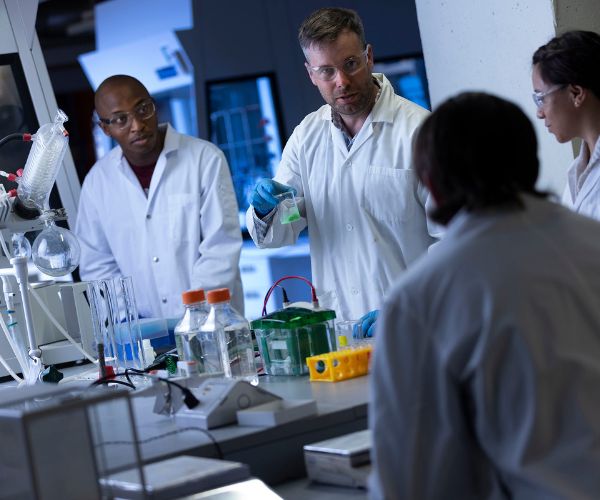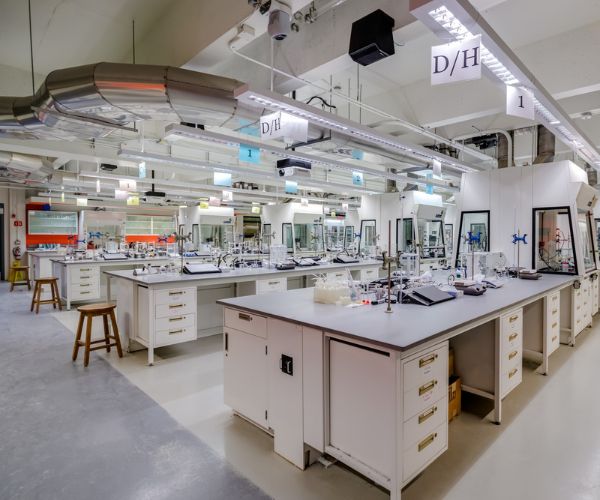Visit Carleton! Book your tour today.
Program Details
Improving the sustainability, quality and safety of food systems is essential to fight climate change and feed a growing population. Food scientists develop products with added nutritional value; they investigate food-borne illness and fraud, design environmentally friendly and smart packaging, and provide expert advice when unsafe foods end up in consumers’ hands. Built on a strong natural sciences foundation and important transferrable skills, Food Science prepares students for the challenges of their generation.
We explore food science as it relates to:
- The global food crisis: Approximately 768 million people are food insecure globally and 10 per cent of people fall ill from food contamination every year. Food Science at Carleton enhances food quality and safety to address food insecurity.
- Climate change: Thirty-three per cent of greenhouse gas emissions originate from food systems yet half of all food produced is wasted. Food Science at Carleton researches sustainable food practices, including ways to reduce food loss and food waste and make use of food by-products.
Capital Advantage
We’ve fostered strong relationships with government departments and agencies like Health Canada, the Canadian Food Inspection Agency, and Agriculture and Agri-Food Canada, providing you with an advantage when entering the workforce.
Work Experience
Food Science at Carleton offers a seamless transition from university to career by providing experiential learning opportunities like hands-on laboratory courses, field-based experiential learning, research opportunities and Co-op.

Get started in Carleton360 to receive tailored information on our programs, student services and community.

Career Outcomes
Explore your passions, refine new skills and discover the career that’s right for you.
Graduates of our program are equipped to tackle global challenges in the natural and life sciences.
Sample Careers
- Agriculture
- Analytical Chemists
- Biotechnology
- Environment and Health
- Environmental Sustainability
- food manufacturing
- Food Product Developer
- Food Safety
- Food Science
- Government
- Microbiologists
- Non-Governmental Organizations
- Nutritional Scientific Evaluators
- Packaging Science
- Policy Analysis
- Product Development
- Public Service
- Quality Assurance
- Research

Sample Courses
FOOD 1001 - Introduction to Food Science
Overview of the food industry. Production, processing, product development, packaging, chemistry, analysis, microbiology. Elements risk assessment, policy making and regulation.
FOOD 4203 - Functional Foods and Natural Health Products
Study of the bioactive components of functional foods and natural health products, for the improvement of health and nutrition. Sources and chemistry of bioactives, mechanisms of actions, process technology, efficacy and safety. Role of research and development in industry in commercialization of new products.
Visit the Undergraduate Calendar to view a comprehensive list of course offerings for this program and discover the exciting things Carleton students are learning in the classroom!
Featured Stories
As part of my Co-op placement, I gained invaluable work experience at the Canadian Food Inspection Agency (CFIA) as a Senior Primary Inspector. I was responsible for inspecting and evaluating commodities, facilities, operation processes and other food-related activities to ensure stakeholder regulatory and risk management compliance. My responsibilities also included conducting Recall Effectiveness Checks to ensure that products identified as posing health risks to consumers were removed effectively during recalls to protect the health and well-being of Canadian consumers. Additionally, I also screened import documents to guarantee that products entering the country complied with applicable Canadian legislation. I believe that my responsibilities at CFIA directly contributed to agency’s mandate of safeguarding the health and well-being of Canadians by mitigating food safety risks while applying the academic knowledge gained from the Food Science program and further expanding my repertoire of skills as a professional.


